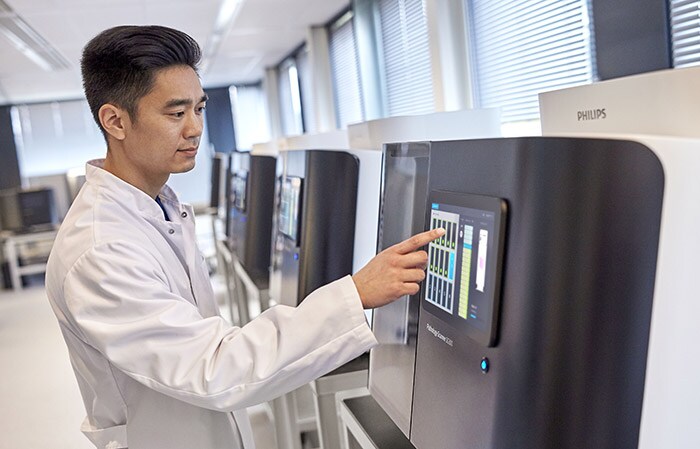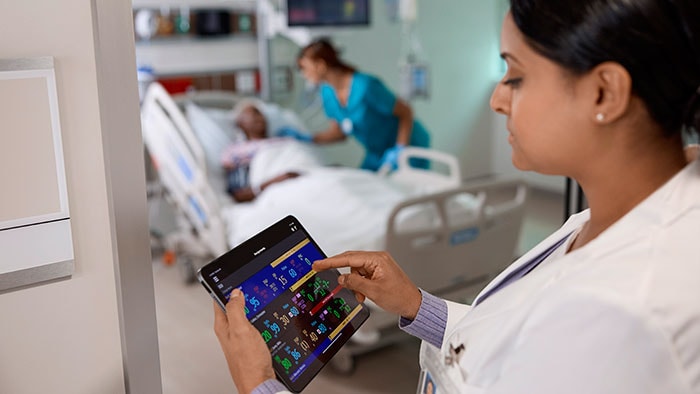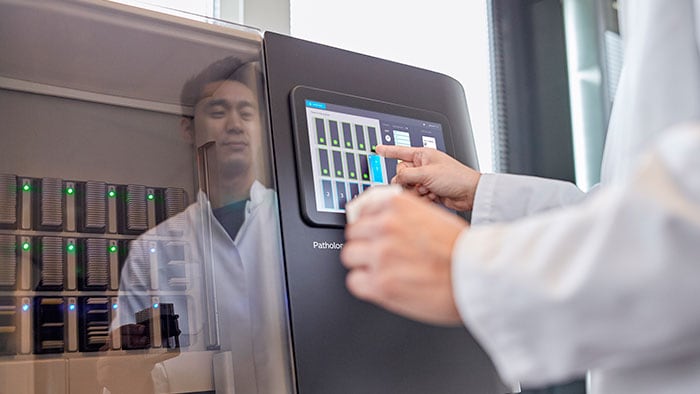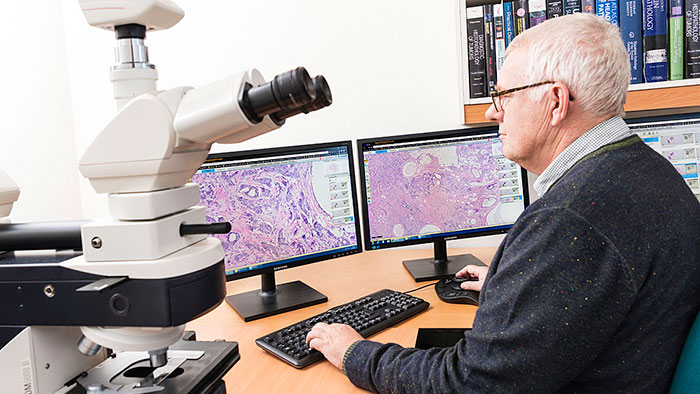The first company to introduce an FDA-approved digital pathology slide scanner for primary diagnostic use in 2017, Philips is one of the founders of digital pathology. In the latest KLAS Research ‘U.S. Digital Pathology 2023’ Performance Insights report, Philips is assessed as having “one of the largest customer bases for primary diagnosis both within and outside the U.S.” for its digital pathology solutions. The company provides a proven and scalable clinical digital pathology solution that combines hardware, software and storage, which can be integrated with enterprise-wide IT infrastructure and AI capabilities [1].
Comprising a high throughput whole-slide scanner software and storage, Philips IntelliSite Pathology Solution delivers diagnostic-quality slide images to pathologists and clinicians wherever they are, uniting care teams and curating data. With all images stored digitally, the solution also allows third-party integration of AI applications [1], and together with PACS it can be used to streamline workflow for improved efficiency, for example by rapidly identifying pathology images that need urgent attention.
"As an early adopter in digital pathology, I am inspired by how far OSUMC has come and how quickly we are advancing the practice of pathology,” said Anil Parwani, Professor of Pathology, Vice Chair and Director of Anatomical Pathology, Director of Pathology Informatics and Director of Digital Pathology at The Ohio State University. “At Ohio State University, we have an end-to-end digital pathology system, utilizing the Philips Digital Pathology platform for clinical care, research, and telepathology. We started this journey in 2017 and today our team averages more than 2,300 scans per day. We are now embarking on deploying AI-based diagnostic and decision support tools, working with applications from several AI vendors. The work we are doing will further advance our pathology practice as well as help others as we continue to pave the path to the future of pathology."
Addressing healthcare challenges today and in the future
Philips’ pathology solution addresses several important challenges faced by today’s healthcare providers. By facilitating more efficient, remote, and collaborative ways of working, it helps mitigate the world’s acute shortage of trained pathologists. As the demand for pathology-based diagnosis increases, especially in response to highly personalized cancer care, greater workflow efficiency means existing pathologists are better able to deal with increasing caseloads as well as easily route cases to specialists for remote reading and/or consultation. For independent pathology labs, greater workflow efficiency also creates opportunities for business growth. One Philips customer highlighted in the KLAS report has over 70 pathologists working fully digitally and with efficiency increasing 15-20% per case.

Adding the power of AI
With digital pathology, healthcare providers can unlock the benefits of AI. Philips IntelliSite Pathology Solution is designed as an open platform that can safely and securely share imaging and other relevant data to provide interoperability with third-party AI applications [1]. For example, 35 pathology labs are already using Philips’ pathology solution in combination with Ibex Medical Analytics’ Galen™ AI diagnostics platform, which generates objective, reproducible results, increases diagnostic confidence, and enables productivity and efficiency improvements. The use of the Ibex Medical platform has been shown to achieve productivity gains of up to 37% [2] and very high accuracy levels across multiple tissue types [3,4]. Philips is currently also working with a range of other medical AI companies, including Paige and VisioPharm, to enable access to third-party AI-driven diagnostic capabilities [1].
“Digital pathology helps mitigate pathologist shortages, saves time, improves quality and enables interdepartmental and external collaboration. As we move forward, we see the potential for AI, predictive analytics and informatics to further enhance outcomes for cancer patients, enabling a shared view of relevant clinical data at precisely the right moment,” said Martijn Hartjes, Clinical Informatics Business Leader at Philips.
Philips’ open-platform approach and ability to securely share data also facilitates medical research with the potential to develop new diagnostic algorithms, disease biomarkers and treatment options based on large-scale digital pathology data sets.
Comprehensive customer support
Since 2019, Philips has helped more than 300 customers and over 20 hospital pathology laboratories go fully digital, meaning that 100% of their pathology slides are digitally scanned, digital diagnosis is the default workflow for the laboratory, and the majority of the lab’s pathologists work digitally from anywhere. In some cases, laboratories have taken a phased approach to achieving fully digital status and in others it has been achieved within days. In every case, Philips prepares the ground by offering workflow consultation, change management, training, and transition support services. [1] PIPS enables iSyntax files, and with the Software Development Kit (SDK) third party companies can use this for AI capabilities.
Read the KLAS Research ‘US Digital Pathology 2023’ Performance Insights report.
[2] Raoux et al. Modern Pathology (2021) 34 (suppl 2): 598-599
[3] Sandbank et al., npj Breast Cancer, December 2022
[4] Sandbank et al, Modern Pathology 2022, 35,513-514
Under the FDA’s Emergency Use Authorization, the use of Philips IntelliSite Pathology Solution in the USA was allowed. With the end of the Emergency Use Authorization, Philips is pursuing a 510k clearance for the PIPS device.
Philips IntelliSite Pathology Solution is in conformance with Regulation (EU) 201 7/746 of the European Parliament and of the Council of 5 April 2017 on In Vitro Diagnostics (IVDR).
Share on social media
Topics
Contact

Anna Hogrebe
Philips Global Press Office Tel: +1 416 270 67 57
You are about to visit a Philips global content page
Continue






